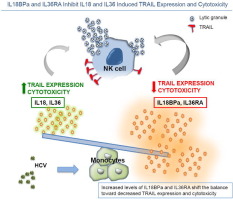当前位置:
X-MOL 学术
›
J. Hepatol.
›
论文详情
Our official English website, www.x-mol.net, welcomes your feedback! (Note: you will need to create a separate account there.)
Monocytes inhibit hepatitis C virus-induced TRAIL expression on CD56 bright NK cells
Journal of Hepatology ( IF 25.7 ) Pub Date : 2017-12-01 , DOI: 10.1016/j.jhep.2017.07.028 Dalila Mele , Stefania Mantovani , Barbara Oliviero , Giulia Grossi , Andrea Lombardi , Mario U. Mondelli , Stefania Varchetta
Journal of Hepatology ( IF 25.7 ) Pub Date : 2017-12-01 , DOI: 10.1016/j.jhep.2017.07.028 Dalila Mele , Stefania Mantovani , Barbara Oliviero , Giulia Grossi , Andrea Lombardi , Mario U. Mondelli , Stefania Varchetta

|
BACKGROUND & AIMS
Natural killer (NK) cells play an important role in the pathogenesis of hepatitis C virus (HCV) infection. We have previously shown that culture-derived HCV (HCVcc) enhance tumor necrosis-factor-related apoptosis-inducing ligand (TRAIL) expression on healthy NK cells, but not on those from patients infected with HCV, which was likely dependent on accessory cells. Here we sought to elucidate the mechanisms involved in altered TRAIL upregulation in this setting. METHODS
Peripheral blood mononuclear cells (PBMC) from controls and patients infected with HCV were exposed to HCVcc. Cell depletions were performed to identify cells responsible for NK cell activation. Flow cytometry and ELISA were used to identify the cytokines involved in the NK activation process. RESULTS
In patients infected with HCV, soluble factors secreted by control PBMC restored the ability of NK cells to express TRAIL. Of note, CD14+ cell depletion had identical effects upon virus exposure and promoted increased degranulation. Moreover, increased concentrations of interleukin (IL)-18 binding protein a (IL-18BPa) and IL-36 receptor antagonist (IL-36RA) were observed after PBMC exposure to HCVcc in patients with HCV. HCVcc-induced NK cell TRAIL expression was inhibited by IL-18BPa and IL-36RA in control subjects. There were statistically significant correlations between IL-18BPa and indices of liver inflammation and fibrosis, supporting a role for this protein in the pathogenesis of chronic HCV infection. CONCLUSIONS
During chronic HCV infection, monocytes play a key role in negative regulation of NK cell activation, predominantly via secretion of inhibitors of IL-18 and IL-36. LAY SUMMARY
Coordination and collaboration between immune cells are essential to fight pathogens. Herein we show that during HCV infection monocytes secrete IL-18 and IL-36 inhibitory proteins, reducing NK cell activation, and consequently inhibiting their ability to express TRAIL and kill target cells.
中文翻译:

单核细胞抑制丙型肝炎病毒诱导的 TRAIL 在 CD56 亮 NK 细胞上的表达
背景与目的 自然杀伤 (NK) 细胞在丙型肝炎病毒 (HCV) 感染的发病机制中起重要作用。我们之前已经表明,培养物来源的 HCV (HCVcc) 增强了健康 NK 细胞上肿瘤坏死因子相关凋亡诱导配体 (TRAIL) 的表达,但在感染 HCV 患者的细胞上没有,这可能依赖于辅助细胞。在这里,我们试图阐明在这种情况下改变 TRAIL 上调所涉及的机制。方法 将来自对照和感染 HCV 患者的外周血单核细胞 (PBMC) 暴露于 HCVcc。进行细胞消耗以鉴定负责 NK 细胞活化的细胞。流式细胞术和 ELISA 用于鉴定参与 NK 活化过程的细胞因子。结果 在感染 HCV 的患者中,对照 PBMC 分泌的可溶性因子恢复了 NK 细胞表达 TRAIL 的能力。值得注意的是,CD14+ 细胞耗竭对病毒暴露具有相同的影响,并促进了脱粒作用的增加。此外,在 HCV 患者的 PBMC 暴露于 HCVcc 后,观察到白细胞介素 (IL)-18 结合蛋白 a (IL-18BPa) 和 IL-36 受体拮抗剂 (IL-36RA) 的浓度增加。HCVcc 诱导的 NK 细胞 TRAIL 表达在对照受试者中被 IL-18BPa 和 IL-36RA 抑制。IL-18BPa 与肝脏炎症和纤维化指数之间存在统计学上显着的相关性,支持该蛋白质在慢性 HCV 感染的发病机制中的作用。结论 在慢性 HCV 感染期间,单核细胞在 NK 细胞活化的负调节中起关键作用,主要通过分泌 IL-18 和 IL-36 抑制剂。概述免疫细胞之间的协调和协作对于对抗病原体至关重要。在此我们表明,在 HCV 感染期间,单核细胞分泌 IL-18 和 IL-36 抑制蛋白,减少 NK 细胞活化,从而抑制它们表达 TRAIL 和杀死靶细胞的能力。
更新日期:2017-12-01
中文翻译:

单核细胞抑制丙型肝炎病毒诱导的 TRAIL 在 CD56 亮 NK 细胞上的表达
背景与目的 自然杀伤 (NK) 细胞在丙型肝炎病毒 (HCV) 感染的发病机制中起重要作用。我们之前已经表明,培养物来源的 HCV (HCVcc) 增强了健康 NK 细胞上肿瘤坏死因子相关凋亡诱导配体 (TRAIL) 的表达,但在感染 HCV 患者的细胞上没有,这可能依赖于辅助细胞。在这里,我们试图阐明在这种情况下改变 TRAIL 上调所涉及的机制。方法 将来自对照和感染 HCV 患者的外周血单核细胞 (PBMC) 暴露于 HCVcc。进行细胞消耗以鉴定负责 NK 细胞活化的细胞。流式细胞术和 ELISA 用于鉴定参与 NK 活化过程的细胞因子。结果 在感染 HCV 的患者中,对照 PBMC 分泌的可溶性因子恢复了 NK 细胞表达 TRAIL 的能力。值得注意的是,CD14+ 细胞耗竭对病毒暴露具有相同的影响,并促进了脱粒作用的增加。此外,在 HCV 患者的 PBMC 暴露于 HCVcc 后,观察到白细胞介素 (IL)-18 结合蛋白 a (IL-18BPa) 和 IL-36 受体拮抗剂 (IL-36RA) 的浓度增加。HCVcc 诱导的 NK 细胞 TRAIL 表达在对照受试者中被 IL-18BPa 和 IL-36RA 抑制。IL-18BPa 与肝脏炎症和纤维化指数之间存在统计学上显着的相关性,支持该蛋白质在慢性 HCV 感染的发病机制中的作用。结论 在慢性 HCV 感染期间,单核细胞在 NK 细胞活化的负调节中起关键作用,主要通过分泌 IL-18 和 IL-36 抑制剂。概述免疫细胞之间的协调和协作对于对抗病原体至关重要。在此我们表明,在 HCV 感染期间,单核细胞分泌 IL-18 和 IL-36 抑制蛋白,减少 NK 细胞活化,从而抑制它们表达 TRAIL 和杀死靶细胞的能力。



























 京公网安备 11010802027423号
京公网安备 11010802027423号